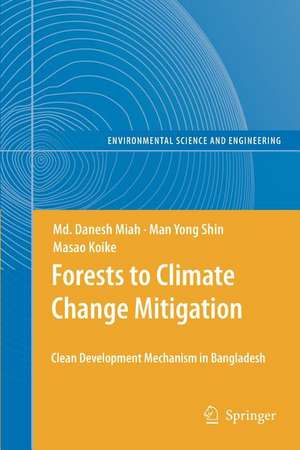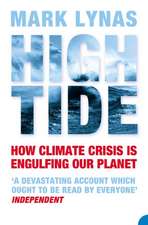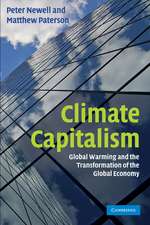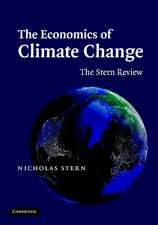Forests to Climate Change Mitigation: Clean Development Mechanism in Bangladesh: Environmental Science and Engineering
Autor Md. Danesh Miah, Man Yong Shin, Masao Koikeen Limba Engleză Paperback – dec 2012
| Toate formatele și edițiile | Preț | Express |
|---|---|---|
| Paperback (1) | 631.53 lei 6-8 săpt. | |
| Springer Berlin, Heidelberg – dec 2012 | 631.53 lei 6-8 săpt. | |
| Hardback (1) | 637.59 lei 6-8 săpt. | |
| Springer Berlin, Heidelberg – 9 oct 2010 | 637.59 lei 6-8 săpt. |
Din seria Environmental Science and Engineering
- 18%
 Preț: 1238.42 lei
Preț: 1238.42 lei - 18%
 Preț: 2166.68 lei
Preț: 2166.68 lei - 18%
 Preț: 1420.88 lei
Preț: 1420.88 lei - 18%
 Preț: 914.20 lei
Preț: 914.20 lei - 18%
 Preț: 1225.94 lei
Preț: 1225.94 lei - 18%
 Preț: 1118.13 lei
Preț: 1118.13 lei - 18%
 Preț: 1402.74 lei
Preț: 1402.74 lei - 18%
 Preț: 3419.93 lei
Preț: 3419.93 lei - 18%
 Preț: 1223.55 lei
Preț: 1223.55 lei - 18%
 Preț: 1008.91 lei
Preț: 1008.91 lei - 18%
 Preț: 1234.46 lei
Preț: 1234.46 lei - 18%
 Preț: 1409.82 lei
Preț: 1409.82 lei - 18%
 Preț: 736.64 lei
Preț: 736.64 lei - 18%
 Preț: 949.73 lei
Preț: 949.73 lei - 18%
 Preț: 1287.47 lei
Preț: 1287.47 lei - 18%
 Preț: 2116.64 lei
Preț: 2116.64 lei - 18%
 Preț: 1231.95 lei
Preț: 1231.95 lei - 15%
 Preț: 641.71 lei
Preț: 641.71 lei - 23%
 Preț: 1129.32 lei
Preț: 1129.32 lei - 18%
 Preț: 1237.93 lei
Preț: 1237.93 lei - 18%
 Preț: 956.18 lei
Preț: 956.18 lei - 24%
 Preț: 1057.94 lei
Preț: 1057.94 lei - 24%
 Preț: 1079.09 lei
Preț: 1079.09 lei - 18%
 Preț: 953.03 lei
Preț: 953.03 lei - 18%
 Preț: 1233.06 lei
Preț: 1233.06 lei - 15%
 Preț: 666.73 lei
Preț: 666.73 lei - 18%
 Preț: 1222.31 lei
Preț: 1222.31 lei - 18%
 Preț: 1242.35 lei
Preț: 1242.35 lei - 18%
 Preț: 1232.89 lei
Preț: 1232.89 lei - 18%
 Preț: 1823.56 lei
Preț: 1823.56 lei - 18%
 Preț: 1228.96 lei
Preț: 1228.96 lei - 18%
 Preț: 1221.69 lei
Preț: 1221.69 lei - 18%
 Preț: 945.79 lei
Preț: 945.79 lei - 18%
 Preț: 1008.28 lei
Preț: 1008.28 lei - 24%
 Preț: 795.50 lei
Preț: 795.50 lei - 18%
 Preț: 1246.47 lei
Preț: 1246.47 lei - 18%
 Preț: 1239.85 lei
Preț: 1239.85 lei - 18%
 Preț: 957.62 lei
Preț: 957.62 lei - 18%
 Preț: 1244.89 lei
Preț: 1244.89 lei - 15%
 Preț: 640.55 lei
Preț: 640.55 lei - 18%
 Preț: 950.33 lei
Preț: 950.33 lei - 18%
 Preț: 1824.01 lei
Preț: 1824.01 lei - 15%
 Preț: 639.59 lei
Preț: 639.59 lei - 18%
 Preț: 947.50 lei
Preț: 947.50 lei - 18%
 Preț: 951.29 lei
Preț: 951.29 lei - 18%
 Preț: 1229.73 lei
Preț: 1229.73 lei
Preț: 631.53 lei
Preț vechi: 742.98 lei
-15% Nou
Puncte Express: 947
Preț estimativ în valută:
120.85€ • 129.22$ • 100.76£
120.85€ • 129.22$ • 100.76£
Carte tipărită la comandă
Livrare economică 17 aprilie-01 mai
Preluare comenzi: 021 569.72.76
Specificații
ISBN-13: 9783642265419
ISBN-10: 3642265413
Pagini: 116
Ilustrații: XVI, 100 p. 20 illus.
Dimensiuni: 155 x 235 x 6 mm
Greutate: 0.17 kg
Ediția:2011
Editura: Springer Berlin, Heidelberg
Colecția Springer
Seria Environmental Science and Engineering
Locul publicării:Berlin, Heidelberg, Germany
ISBN-10: 3642265413
Pagini: 116
Ilustrații: XVI, 100 p. 20 illus.
Dimensiuni: 155 x 235 x 6 mm
Greutate: 0.17 kg
Ediția:2011
Editura: Springer Berlin, Heidelberg
Colecția Springer
Seria Environmental Science and Engineering
Locul publicării:Berlin, Heidelberg, Germany
Public țintă
Professional/practitionerCuprins
Climate Change Mitigation by the Forestry Options in Bangladesh.- CDM Forests om Bangladesh and Learning from the Reforestation Success of the Republic of Korea.- Implications of Biomass Energy and Traditional Burning Technology in Bangladesh.- Carbon Sequestration in the forests of Bangladesh.- Conclusions and Recommendations
Textul de pe ultima copertă
Today, the effect of global climate change is clear to all. It is clearly dangerous in developing countries such as Bangladesh. The industrial revolution made the major changes in the technology, socio-economy and cultures in the late 18th and early 19th century, beginning in Britain and spreading throughout the world. The technology dominated economy was mostly dependent on energy produced from fossil fuel, which is holds true today as well. It is well known that fossil fuel burning has increased the GHGs to the atmosphere, thus creating global warming. Among the GHGs, the concentration of CO2 has been confirmed as the largest. Terrestrial ecosystems are clearly influencing the concentration of GHGs in the atmosphere. Greenhouse gases are constantly entering and leaving the atmosphere. Actively growing trees and other plants absorb CO2 from the atmosphere, combine it with water through photosynthesis and create sugars and more stable carbohydrates. Through this process, trees capture and store atmospheric CO2 in vegetation, soils and biomass products. The Kyoto Protocol, in 1997, explored a flexible mechanism, CDM (Clean Development Mechanism) where Annex I and non-Annex I parties interact for climate change mitigation. Forestry activities have been considered important in the arena of climate change as they act both as a sink and sources of carbon. The purpose of this book is to highlight the and ways means of efficiently reducing global warming through the forestry options in Bangladesh, with the implications of CDM.
Caracteristici
Finds out the means and ways to contribute efficiently to reducing global warming through the forestry options in Bangladesh with the implications of CDM Gives a comprehensive account of the forestry CDM projects Emphasizes the role of the biomass in the CDM forestry projects Includes supplementary material: sn.pub/extras









